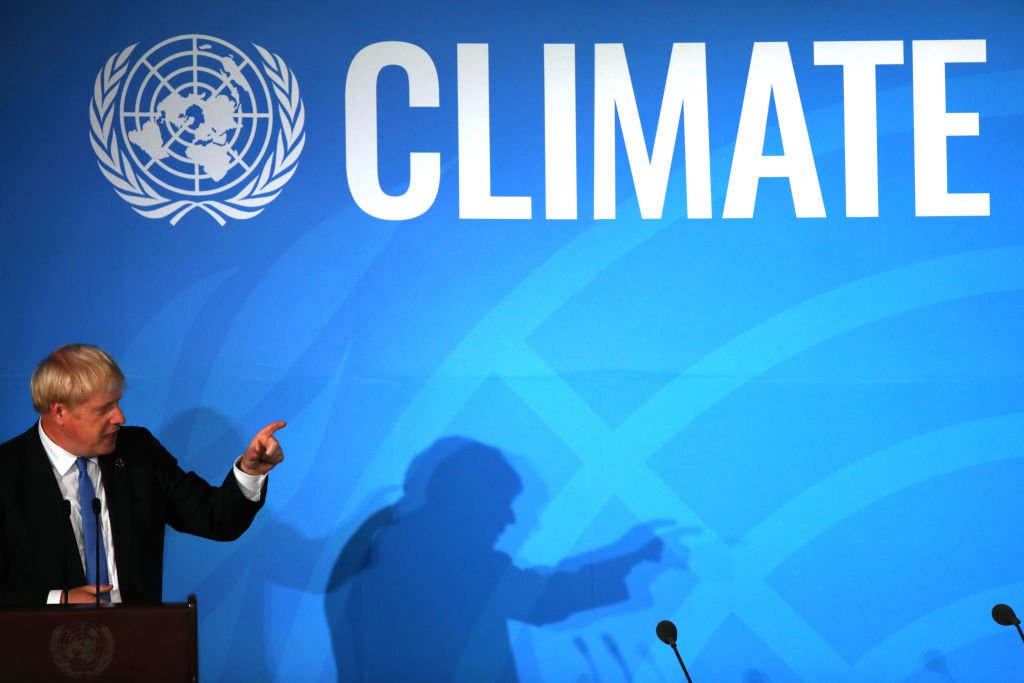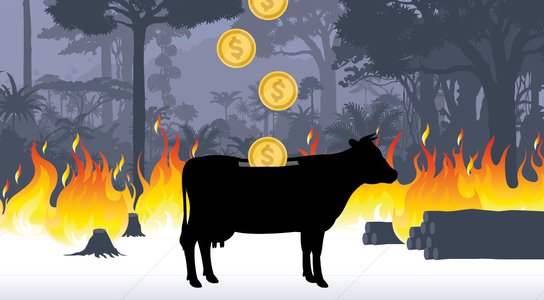Two years ago today, the UK Parliament declared a climate emergency. Yet as we know, the climate crisis has already been an emergency for many countries and communities for decades, from the black and brown communities most impacted by air pollution including in the UK, US and globally, to the frontline defenders and local communities around the world who face threats and even murder for standing up for their land and environment.
This emergency is growing graver by the day, and it demands unprecedented political action by international governments to meet the moment.
As the UK gears up to host the G7 Summit and the COP26, the government has a once-in-a-generation opportunity to show real global climate leadership. At the Leaders Summit on Climate a few weeks ago, Boris Johnson told global leaders to ‘get serious’ about climate change. But the question is, will his rhetoric be matched with action?
UK Prime Minister Boris Johnson speaks at the UN Climate Action Summit in 2019. Spencer Platt/Getty Images
More hot air in a heating climate?
Based on what we’ve seen so far, there is some reason to be sceptical that his government will move beyond headline-grabbing announcements towards the transformative change we urgently need.
While they may talk a good game, the UK government is still being influenced by the main culprits behind climate change - fossil fuels companies. For example, they held private meetings with major polluters such as BP and Shell about the COP26 summit, where the companies were reportedly ‘offering money in return for exposure at COP26 and in one case saying they could act as an intermediary between UK officials and other governments around the world’. Moreover, the government has allowed the fossil fuel industry to continue drilling for new oil and gas in the North Sea and has spent around £12bn per year of taxpayers money subsidising the sector, despite any new oil and gas being incompatible with limiting warming to 1.5C.
Meanwhile, they are still flirting with opening a coal mine in Cumbria, which would have negative consequences for the climate, as well as being a blow to the UK’s climate credibility. The government also appointed a climate sceptic in the former Australian PM Tony Abbott as their trade adviser and slashed international aid, which sends a worrying signal to developing countries and could affect their efforts to cope with the impacts of climate change. While Boris Johnson recently announced an ambitious new target of reducing carbon emissions by 78% by 2035, the UK remains far off track in meeting its existing targets for 2025 and 2030.
When it comes to tackling deforestation, which is a key driver of the climate crisis, the UK government, along with the US, Norway and major global brands launched a new initiative to fund efforts to stop tropical deforestation. However, any new pledges of financing to tackle deforestation are undermined by the much greater sums flowing from the UK’s financial sector to businesses driving deforestation, biodiversity loss and human rights abuses.
As we reported, UK-based financial institutions were the single biggest source of international finance for six of the most harmful agribusiness companies involved in deforestation in the climate-critical forests of Brazil, the Congo Basin and Papua New Guinea, providing a staggering £5 billion between 2013 and 2019. Yet the government’s current proposed legislation on tackling global deforestation lets the UK finance sector off the hook, despite the recommendations of its own green taskforce (the Global Resource Initiative) to include finance in the law.
Forests, fossil fuels and corporate accountability - key areas for UK action
Those are just some of the many examples suggesting the UK government’s climate commitments risk being little more than hot air. If they are serious about being climate leaders, they need to start practicing what they preach and take real action.
First, the UK government must do more to tackle the UK’s imported deforestation footprint, associated with its consumption and financing of agricultural commodities driving global forest destruction. We welcome the inclusion of shipping and aviation in the UK’s emission targets for the first time and hope this signals a willingness to look beyond our own borders when considering our responsibility for fuelling global climate change. The deforestation provision in the upcoming UK Environment Bill is a crucial opportunity to do this but for it to be effective, it must be strengthened in several ways.
The law must apply to all UK businesses, including financial institutions, so that they can no longer bankroll deforestation and related human rights abuses around the world. Moreover, it must be amended to include all deforestation, not just that deemed illegal under local laws, as this misses 50% of the tropical deforestation taking place. Crucially, the legislation must also go further in upholding the rights of indigenous people and forests communities, who have safeguarded their forests for generations and are on the frontline of defending our climate.
Robust UK legislation on global deforestation would send a signal to other governments that they must act to tackle the supply chains and financing driving forest destruction. Keeping the world’s forests standing is not only crucial for stopping climate catastrophe but also for helping to prevent further pandemics of zoonotic diseases like Covid-19.
Second, the UK must also pass broader due diligence and liability legislation to compel all businesses operating in the UK to ensure they are not contributing to environmental and human rights abuses in their value chains, including the ongoing threats and murders against land and environmental defenders. 212 were killed in 2019, according to Global Witness research - an average of more than 4 people a week. The EU has committed to bring forward comprehensive legislation in 2021 to ensure corporate accountability and uphold the rights of frontline defenders and the UK should step up if it doesn't want to be left behind.
Third, the government must produce a proper roadmap to end the extraction and burning of fossil fuels, including ending fossil fuel subsidies, ending oil and gas licencing in the North Sea and planning a phase-out of fossil gas use in homes and power stations. Concrete action on fossil fuels will not only help prevent further climate breakdown but also save millions of lives through reducing air pollution.
Finally, the UK government must stop listening to the vested interests who are polluting the planet, and instead build policies around the expertise of scientists, activists and, especially, the communities that are most impacted by the effects of the climate crisis. This includes ensuring that they use their hosting of COP to prioritise and heed the voices of land and environmental defenders, indigenous communities, communities of colour and Global South countries and that it doesn’t become yet another influencing opportunity for oil and gas companies.
A unique opportunity to show global climate leadership
As Boris Johnson recently called on global governments to 'let the history books show that it was this generation of leaders that possessed the will to preserve our planet for generations to come', his own credibility and legacy will depend on whether or not he lives up to this aspiration.
The eyes of the world will be on the Prime Minister at the G7 and COP26 - will it be more empty promises or will he step up to this test of their leadership and push forward an era of greener, more sustainable and equitable solutions to the climate crisis?
